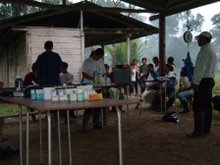
I was recently reading a magazine article (it might have been Cosmo at the gym, don't judge) that cited education as one of the most important predictors of health and long life. My thoughts immediately drifted to the hundreds of Southern Sudanese kids who I communicate with daily as they plead for money to attend school. The emails are desperate, often in all capital letters with scanned documents to legitimize their requests. They address me as sister, and my mom as mum.
It's all about education.
That's exactly what I think in the very different but distantly related context of the soda wars in the highlands of Chiapas. Traipsing through the mountains for our interventional stove study last year, my classmates and I were awed to find that Pepsi and Coca-Cola were duking it out in literally every community in the mountains. It was cheaper to buy a bottle of soda than a bottle of purified water. And it wasn't just soda, but all kinds of processed foods, including chips, cookies and other diabetes-inducing goodies. Considering my personal history as a Berkeley grad, an MPH, a med student and a (closet) hippie enthusiast, it may seem surprising that what bothered me most about the whole situation was not the presence of big business in the communities, but the poverty of health education that rendered the Chiapanecos unable to make healthy choices.
Big business can bring a lot of good, but it has to be consumer-driven, and to drive consumption, consumers need information. WIthout education, how can they make healthy choices? By shielding them from the evils of a cool, crisp, wonderful bottle of Coke? Why is it that they can't handle the responsibility of junk food, and we can? I don't even want to know what inhabitants of developed countries like the US and Britain would do without carbonated beverages and convenience foods. Besides, if we protect underdeveloped communities from consumer goods that happen to bring them diabetes, what else will we deprive them of? Antibiotics that kill shigella, because they create resistance? That doesn't make much sense.
Back to the Southern Sudanese. I always thought of education as important because it allows you to buy things that you need to be healthy: a place to live, a balanced diet, clean water, soap, etc. But that isn't the only reason education is healthy. Studies show unequivocally that educated women are not only healthier themselves, but also nurture healthier families, than their uneducated counterparts. And by education I refer to more than knowledge about boiling drinking water or washing hands after using the latrine. I am talking about the sort of education that opens your eyes and your mind to different spaces, whether they are social, physical or entirely abstract.
It's obvious how important health is to a community. My dad always says if you don't have your health-physical AND mental health-you don't have anything. And if education is a great predictor of health, then it's a very worthy and economically sound goal to focus resources on improving access to and quality of education.
Obama has already signed off on long-awaited SCHIP expansion plans. That's great. In our current health system, people need insurance to get care. But I didn't have to go as far as Southern Sudan or the highlands of Chiapas to prove how desperately we need to meet a basic standard of education right now. I don't have to look much further than a 10-mile radius from my current home at UC Irvine. The quality of public education in America is appallingly poor. And in other countries, it's often a combination of poor quality, poor access, and high expense.
So while health is a vital resource for living, let's not forget about the things that lead to health. Education is one of those things, and it's an investment whose return is more profitable than we apparently realize.





1 comment:
wonderfully written farah! thanks for sharing your thoughts. i am always amazed at how many of our underserved children's parents are unaware of what grades they are getting in school. not surprisingly, those kids are often not doing well.
Post a Comment